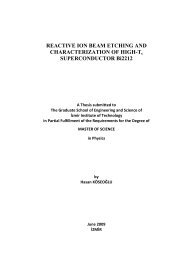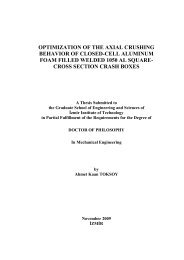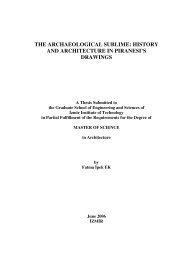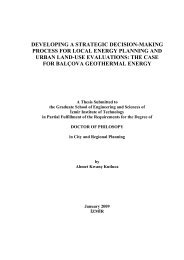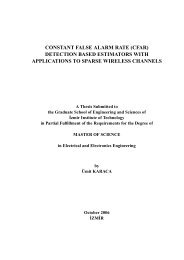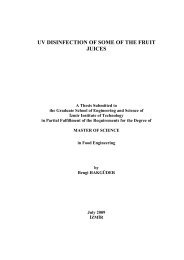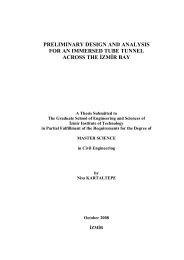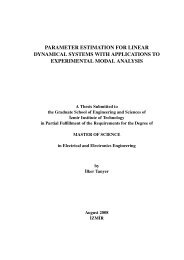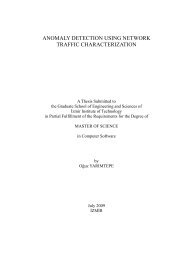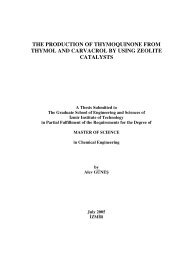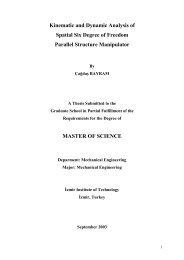a critical evaluation on the concept of justice in planning process
a critical evaluation on the concept of justice in planning process
a critical evaluation on the concept of justice in planning process
Create successful ePaper yourself
Turn your PDF publications into a flip-book with our unique Google optimized e-Paper software.
pr<strong>in</strong>ciples <strong>in</strong> his <strong>the</strong>ory <strong>of</strong> <strong>justice</strong> (as fairness) and <strong>the</strong> regulati<strong>on</strong> <strong>of</strong> “territorial social<br />
<strong>justice</strong>” Harvey has proposed for a liberal society <strong>in</strong> “just distributi<strong>on</strong> justly arrived at”,<br />
are as follows:<br />
“1. The distributi<strong>on</strong> <strong>of</strong> <strong>in</strong>come should be such that (a) <strong>the</strong> needs <strong>of</strong> populati<strong>on</strong> with<strong>in</strong><br />
each territory are met, (b) resources are so allocated to maximize <strong>in</strong>terterritorial<br />
multiplier effects, and (c) extra resources are allocated to help overcome special<br />
difficulties stemm<strong>in</strong>g from <strong>the</strong> physical and social envir<strong>on</strong>ment.<br />
2. The mechanisms (<strong>in</strong>stituti<strong>on</strong>al, organizati<strong>on</strong>al, political and ec<strong>on</strong>omic) should be<br />
such that <strong>the</strong> prospects <strong>of</strong> <strong>the</strong> least advantaged territory are as great as <strong>the</strong>y possibly<br />
can be.<br />
If <strong>the</strong>se c<strong>on</strong>diti<strong>on</strong>s are fulfilled <strong>the</strong>re will be a just distributi<strong>on</strong> justly arrived at” 33<br />
(Harvey;1993;116-117).<br />
Similar debates <strong>in</strong> field <strong>of</strong> <strong>the</strong> plann<strong>in</strong>g discipl<strong>in</strong>e has commenced <strong>in</strong> <strong>the</strong> post-<br />
1960 period. Accord<strong>in</strong>g to <strong>the</strong> prevail<strong>in</strong>g paradigm <strong>of</strong> <strong>the</strong> 1960s, <strong>the</strong> fundamental<br />
approaches <strong>of</strong> plann<strong>in</strong>g are given <strong>in</strong> words <strong>of</strong> Krumholz as follows:<br />
“1. city plann<strong>in</strong>g apolitical <strong>in</strong>stead <strong>of</strong> serv<strong>in</strong>g a narrow political objective, served “<strong>the</strong><br />
public <strong>in</strong>terest” or <strong>the</strong> community as a whole, 2. a unitary plan prepared by a public<br />
agency was adequate to express <strong>the</strong> <strong>in</strong>terest <strong>of</strong> <strong>the</strong> entire community, 3. city plann<strong>in</strong>g<br />
was <strong>the</strong> plann<strong>in</strong>g <strong>of</strong> land uses which, if articully d<strong>on</strong>e, with attenti<strong>on</strong> to green space and<br />
close proximity <strong>of</strong> l<strong>in</strong>ked activities, would improve <strong>the</strong> quality <strong>of</strong> city life”(Krumholz,<br />
1994,150). In this approach, <strong>the</strong> debates <strong>of</strong> <strong>justice</strong> and equality are kept distant from <strong>the</strong><br />
field <strong>of</strong> plann<strong>in</strong>g discipl<strong>in</strong>e.<br />
On basis <strong>of</strong> this approach, how will planners approach <strong>the</strong> lived <strong>in</strong>equalities?<br />
Should <strong>the</strong> levels <strong>of</strong> <strong>in</strong>equality (<strong>in</strong> terms <strong>of</strong> both <strong>the</strong> social <strong>in</strong>equalities and <strong>in</strong>equality <strong>in</strong><br />
distributi<strong>on</strong> <strong>of</strong> urban facilities), polarizati<strong>on</strong>s and territories <strong>of</strong> poverty, all experienced<br />
by cities <strong>of</strong> our day be a matter <strong>of</strong> debate for <strong>the</strong> plann<strong>in</strong>g discipl<strong>in</strong>e and planners?<br />
C<strong>on</strong>cern<strong>in</strong>g what <strong>the</strong> attitude <strong>of</strong> a planner shall be <strong>in</strong> this subject matter, David<strong>of</strong>f has<br />
declared his op<strong>in</strong>i<strong>on</strong>s <strong>in</strong> 1978 as <strong>in</strong> <strong>the</strong> follow<strong>in</strong>g:<br />
“If a planner is not work<strong>in</strong>g directly for <strong>the</strong> objective <strong>of</strong> eradicat<strong>in</strong>g poverty and radical<br />
and sexual discrim<strong>in</strong>ati<strong>on</strong>, <strong>the</strong>n she or he is counter-productive. If <strong>the</strong> work is not<br />
33 Follow<strong>in</strong>g <strong>the</strong> political ec<strong>on</strong>omy critiques <strong>of</strong> urban <strong>in</strong>equalities he has realized from a Rawlsian<br />
perspective dur<strong>in</strong>g <strong>the</strong> first period, Harvey re-evaluates <strong>the</strong> problem <strong>of</strong> urban <strong>justice</strong> from a poststructuralist<br />
perspective. In this perspective pursu<strong>in</strong>g Young, he evaluates <strong>in</strong> cultural terms <strong>the</strong> debate <strong>on</strong><br />
<strong>justice</strong> for livable cities. Although he c<strong>on</strong>centrates <strong>on</strong> <strong>justice</strong> pr<strong>in</strong>ciples <strong>of</strong> Young’s approach and does not<br />
aband<strong>on</strong> <strong>the</strong> distributi<strong>on</strong>al pr<strong>in</strong>ciples, he sets forth <strong>the</strong> cultural values. With regard to how a just plann<strong>in</strong>g<br />
and policy implementati<strong>on</strong> should be, he determ<strong>in</strong>es six aspects <strong>of</strong> <strong>justice</strong>.<br />
46



